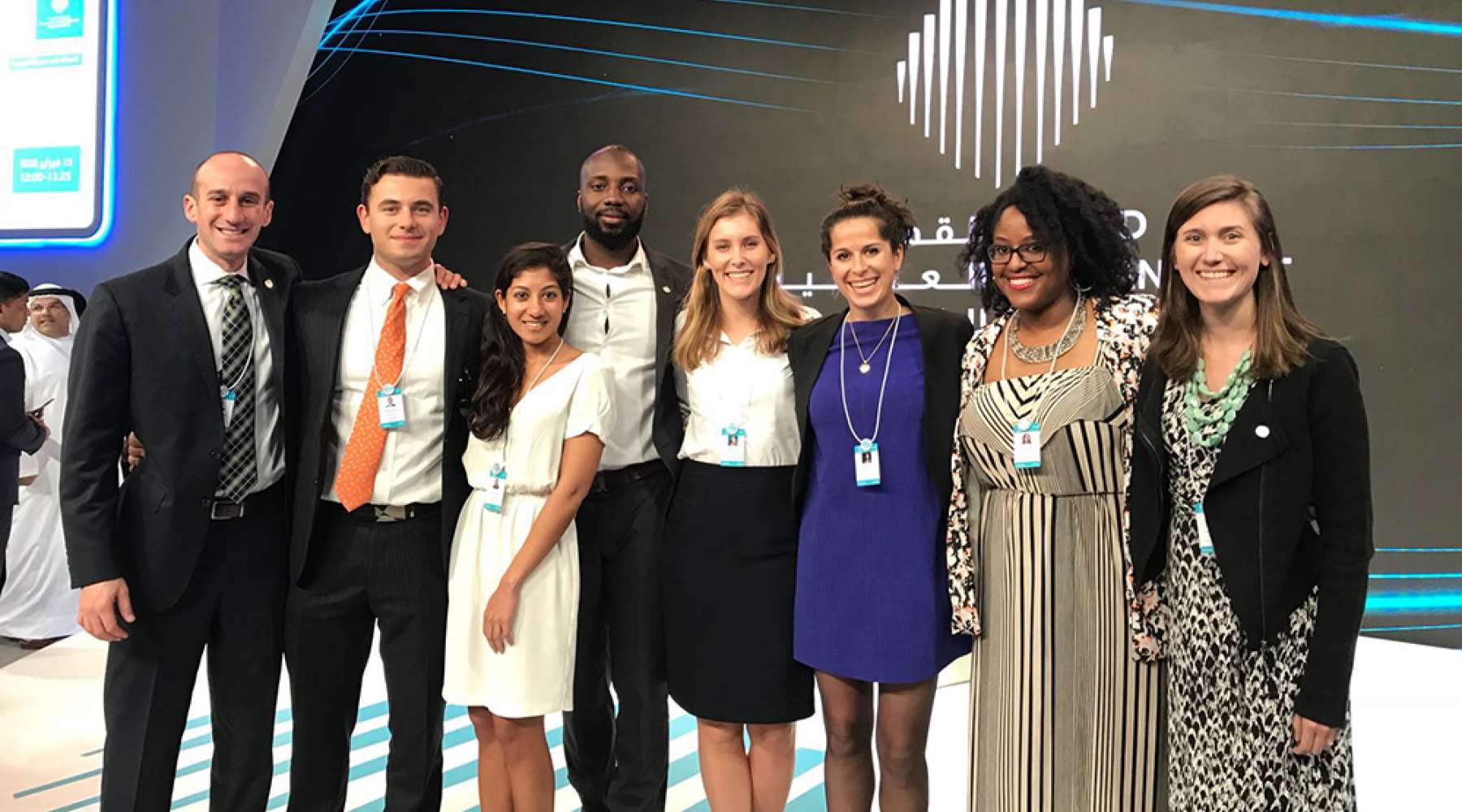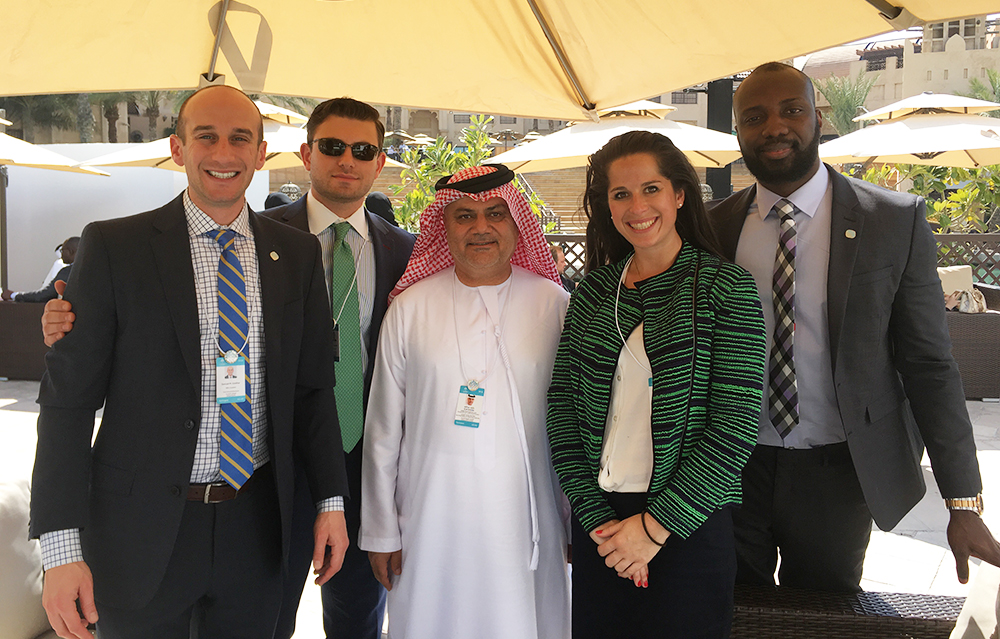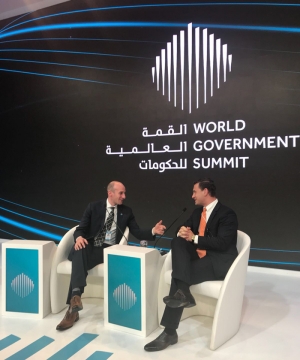
In February 2018, for the first time, Tuck took part in the World Government Summit (WGS). The WGS is a global platform dedicated to shaping the future of governments worldwide. It is a knowledge-exchange forum that brings together leaders of businesses and non-profit institutions to discuss problems, solutions, and global trends in areas ranging from education to space travel. This year was the sixth edition of the Summit. It brought luminaries such as Narendra Modi, the Prime Minister of India; Christine Lagarde, managing director of the International Monetary Fund (IMF); Jim Yong Kim, president of the World Bank and former president of Dartmouth College; astrophysicist Neil deGrasse Tyson, and many others. One article is not enough to describe the caliber and opulence of the event, but the pictures might
The opportunity to attend the WGS was sourced by Alen Amini T’18 and Cole Boske T’19 and generously co-sponsored by the MBAPO. Tuck sent a delegation of nine students representing a mix of first- and second-year students.
The Summit was an action-packed three-day event that combined talks, panels, networking sessions, and cultural events. Day one opened with an address from founder and chairman of the World Economic Forum in Davos, Professor Klaus Schwab, who spoke about the key global challenges in 2018:1. Geopolitical risk 2. Growing income gap 3. Cyber security & artificial intelligence (AI) and 4. the Fourth Industrial Revolution. Of these four, he highlighted the proliferation of AI and gender parity to be of particular importance in 2018. The talks and presentations that followed addressed these and other issues.
One of the most notable speakers on the opening day was prime minister of India Narendra Modi. He praised Dubai as a miracle that transformed from a desert to a futuristic metropolis. Modi also emphasized the importance of technology as a tool to speed up development, and listed the “Six Rs of environment friendliness: Reduce, Reuse, Recycle, Recover, Redesign, and Remanufacture—all of this leads to another R—Rejoice.”
The highlight for me on day one was the talk by Neil deGrasse Tyson on the Future of Colonizing Space. He stated that all major funded projects in the human history were due to 1. A war or defense initiative (e.g., Apollo project, the Great Wall of China) 2. in praise of royalty or a deity (e.g., Pyramids, Versailles) or 3. A promise of economic return (e.g., Columbus, Magellan). Therefore, unless one of these three items is certain, space colonization will not be as actively pursued as it is speculated.
Day two continued to impress. Robynne Chutkhan, the founder and CEO of Digestive Center for Wellness, discussed the importance of the microbiome in human health. The main takeaways from her speech were that we can improve our immunity by 1. medicating less 2. eating more fruits and vegetables and 3. spending more time in nature. At Tuck we certainly have had plenty of exposure to nature, which makes Tuck probably the healthiest MBA school.
Other speakers on day two included Arianna Huffington, president and editor-in-chief of the Huffington Post and founder and CEO of Thrive Global, who spoke about the 3rd Women’s Revolution; and Jim Yong Kim who discussed the importance of investment in human capital as an enabler of faster and more sustainable development.
The third and last day’s speakers included Malcolm Gladwell on the Future of Humanity, Will.I.Am on access to technology in underserved communities, and presentations on AI and the future of work.
Each day, there were ample opportunities to network with other attendees and representatives from other schools. Before we knew it, we were chatting with representatives of the Ministry of Energy of Abu Dhabi, Indian traditional dancers, entrepreneurs who founded VC companies, and representatives from the Ministry of Foreign affairs of Pakistan (introduction courtesy of Jamie Mittelman T’19). The Summit also offered cultural events, such as tours of the old town, visits of the desert, and traditional dinners. These were great opportunities to connect with other attendees in an informal setting.

Tuck students, Sam Goldhar T’18, Vitalie Djugostran T’18, Jamie Mittelman T’19, and Pascal Mensah T’18 with the representatives of the Ministry of Energy of Abu Dhabi

Sam Goldhar T’18, president of the Tuck Student Body, being interviewed by Vitalie Djugostran T’18 in the Dewa Hall at the World Government Summit
I had the chance to interview the president of the Tuck student body, Sam Goldhar T’18, on the importance of Tuck’s participation in international events of high caliber as another way to market the school internationally. We hope that attendance to the WGS and other similar events will become a regular occurrence.
WGS also hosted the University Challenge, which is a competition between top global business and public policy schools to develop a list of recommendations in response to a prompt and present it to a panel of judges. This year, the prompt was to imagine and describe Dubai in 2031 and outline a roadmap to shift to a knowledge-based economy by 2071. Although Tuck did not take part in it this year, I am sure that the next Tuck delegations to the WGS’s University Challenge will represent the school well.